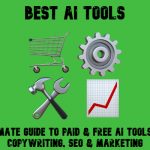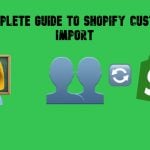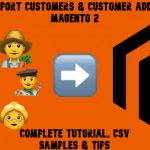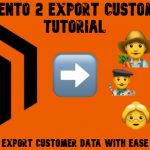Why Choose HubSpot in 2026? Full CRM Review, Alternatives, & Pricing Breakdown
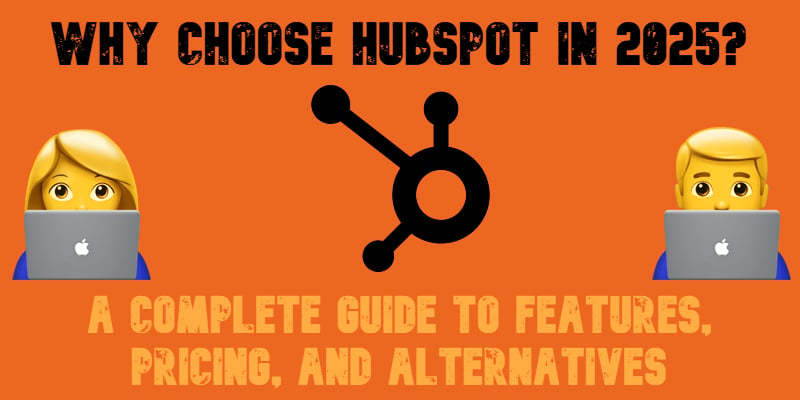
What is HubSpot, and why are so many businesses choosing it as their go-to CRM? In today’s digital economy, companies rely on powerful SaaS platforms to streamline operations, boost sales, and build long-term customer loyalty. HubSpot CRM is one of the most popular and versatile solutions in this space. This cloud-based software helps businesses manage marketing, sales, and customer service from a single dashboard.
Instead of wrestling with complicated software installations or updates, you get secure, accessible, and high-performing tools delivered right through your browser. HubSpot takes care of everything — from data security to feature updates — so you can focus on growth.
In this guide, we explain why you should choose HubSpot in 2026. You will learn what HubSpot is, what sets HubSpot CRM apart, HubSpot pricing plans, and which HubSpot alternatives are worth considering. Whether you’re a startup or scaling enterprise, you’ll discover why choosing HubSpot might be one of your smartest business decisions. Grow smarter with HubSpot — learn why it’s among the best AI tools for inbound marketing and CRM.

Table of contents
- What is HubSpot?
- HubSpot Ecosystem: One Platform for Your Entire Front Office
- Breeze: HubSpot’s AI-Powered Engine Transforming CRM in 2026
- Core HubSpot Features: Everything A CRM Solution Needs
- HubSpot Pricing Explained: What You Need to Know Before You Buy
- HubSpot Alternatives: When Is Another CRM a Better Fit?
- Final Verdict: Why Choose HubSpot in 2026?
- Frequently Asked Questions About HubSpot CRM
What is HubSpot?
HubSpot is a leading AI-powered customer platform designed to help businesses grow by unifying their marketing, sales, customer service, and content management activities. Built as an all-in-one SaaS solution, HubSpot enables companies to attract leads, convert customers, and nurture relationships — all from a single, easy-to-use interface.
At its core, HubSpot CRM offers a centralized system for managing customer data, tracking interactions, automating workflows, and optimizing every step of the buyer journey. Whether you’re running email campaigns, managing your sales pipeline, or delivering personalized customer support, HubSpot brings everything together under one roof.
But HubSpot is more than just a CRM. It’s a full ecosystem of tools tailored for growing businesses — from free marketing and sales features to advanced automation and AI-powered analytics. It’s no surprise that thousands of companies prefer this solution. So, why choose HubSpot in 2026?
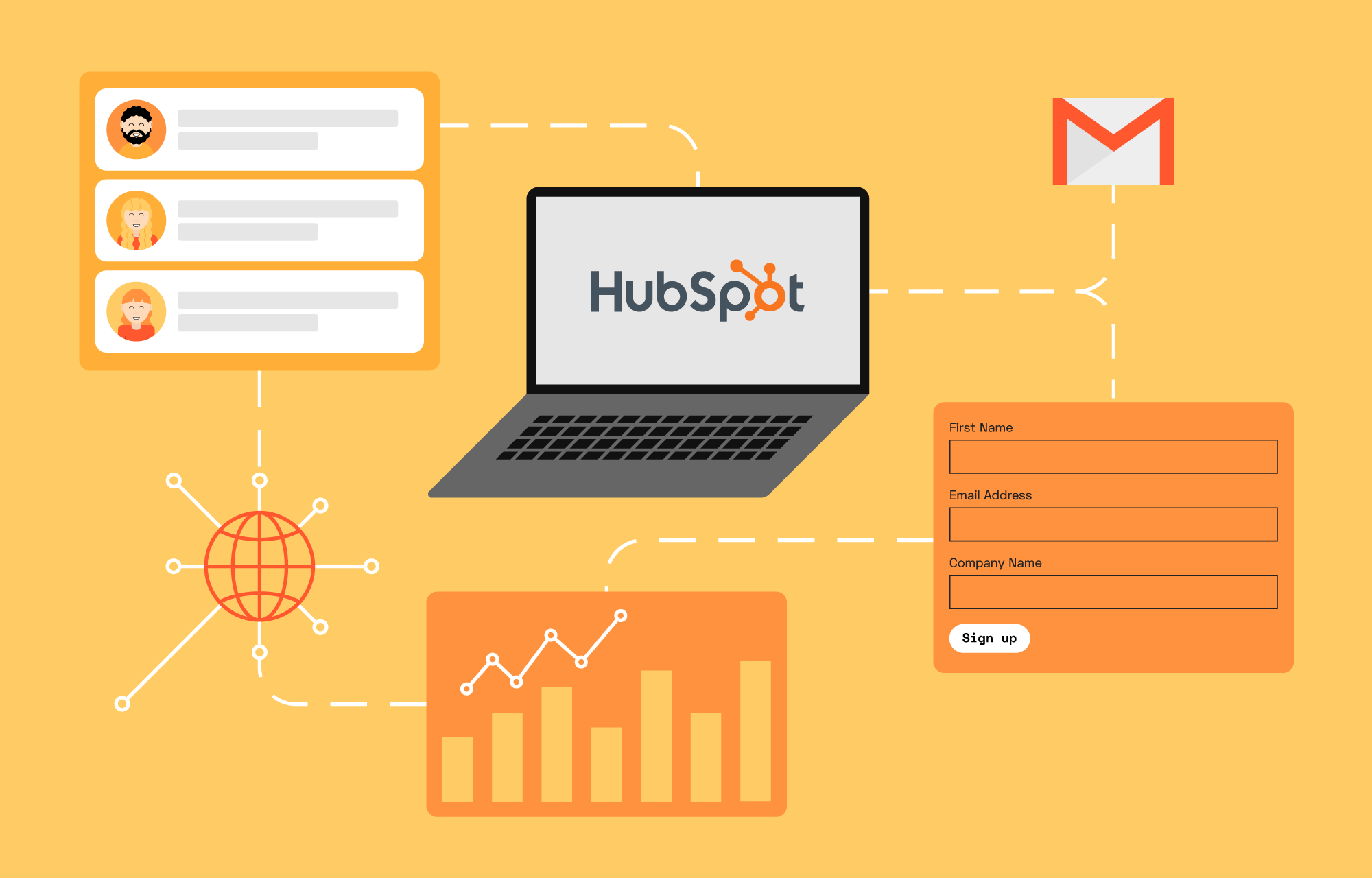
HubSpot Ecosystem: One Platform for Your Entire Front Office
Powered by AI and built for ease of use, HubSpot delivers fast value while giving every team a shared view of the customer journey. Each HubSpot product is powerful on its own, but when used together, they create a seamless experience that drives growth at every stage of your business.
Let’s explore the core HubSpot products that make up this all-in-one CRM solution.
Marketing Hub — Attract Leads & Automate Your Marketing Efforts
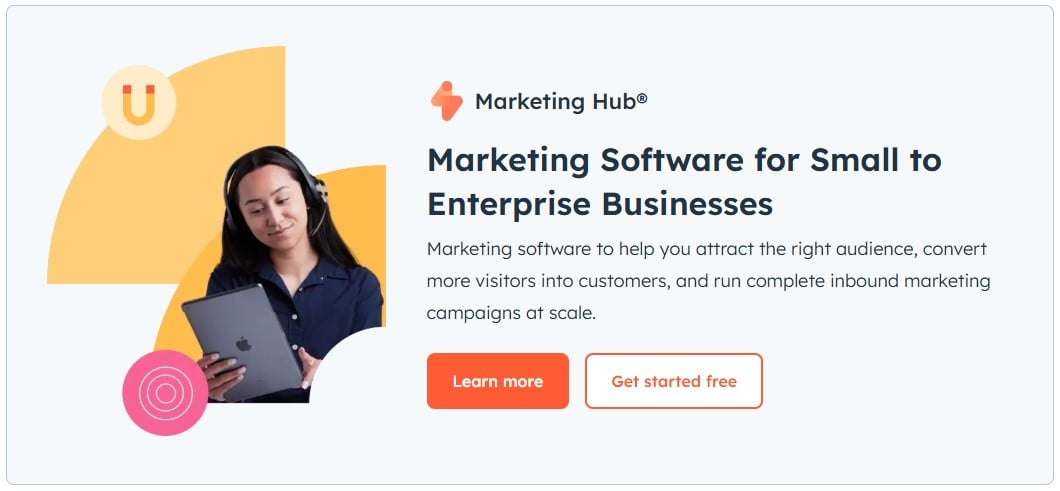
What is HubSpot if not your marketing team’s secret weapon? With AI-driven tools and automation baked into every feature, HubSpot Marketing Hub is built to help you generate demand, convert traffic, and prove ROI.
- Generate leads. Capture visitor information using forms, pop-ups, and chatbots. Use landing pages and content offers to turn strangers into contacts in your database — no code required.
- Automate marketing. Use smart workflows to send emails, score leads, and trigger campaigns based on user behavior. AI suggests the best times to send, segments your audience, and optimizes messaging for higher conversion.
Whether you’re launching your first campaign or managing thousands of contacts, HubSpot helps marketing teams scale smarter.
Popular features:
- Breeze Social Media Agent. This AI assistant helps schedule, publish, and optimize social media posts across platforms. It can even analyze engagement trends to suggest content improvements — saving hours of manual work.
- Marketing Automation. Build email sequences, set up triggers based on user behavior, and personalize outreach at scale. Automation lets you create tailored experiences for every stage of the buyer’s journey, from welcome emails to abandoned cart follow-ups.
- Analytics. Understand what’s working (and what’s not) with powerful dashboards. From campaign ROI to customer attribution paths, Marketing Hub provides the data you need to optimize decisions and prove marketing impact.
Whether you’re a solo marketer or managing a team, Marketing Hub simplifies the complexities of multichannel campaigns and ensures you always stay one step ahead.
Sales Hub — Close More Deals Faster
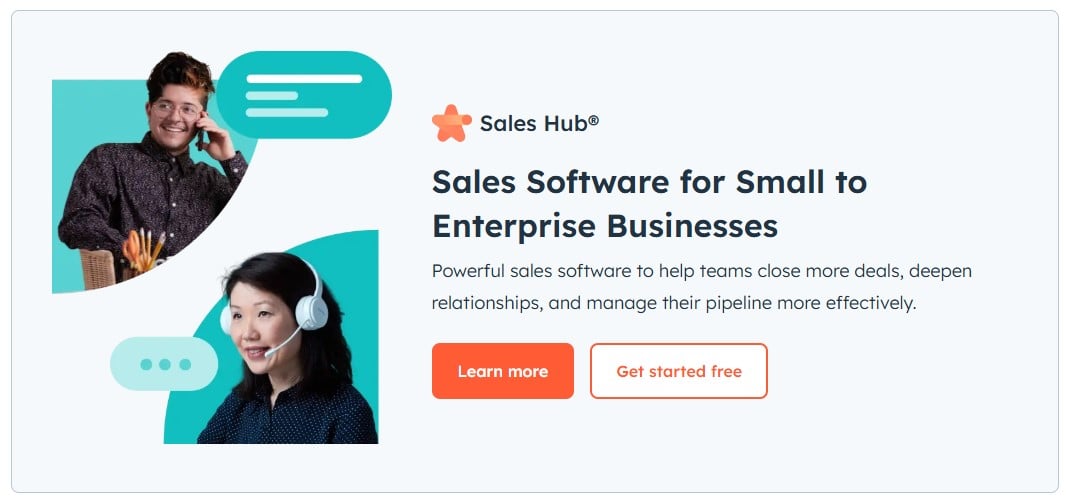
HubSpot Sales Hub is designed to streamline your sales process — from finding prospects to sealing the deal. It combines automation, AI, and deep CRM integration to help your team sell more in less time.
- Build pipeline. Use HubSpot’s prospecting tools and AI-powered lead scoring to identify high-quality prospects. Sales reps can prioritize outreach based on real-time engagement signals and CRM data.
- Close deals. Automate follow-ups, track deal stages, and manage your entire pipeline from a single workspace. With templates, sequences, and forecasting tools, Sales Hub reduces friction and increases win rates.
If you’re wondering why choose HubSpot over other CRM tools, this seamless sales experience is one of the biggest reasons.
Popular features:
- Sales Workspace. A unified dashboard for sales reps to view deals, track activities, and prioritize tasks. It brings together emails, calls, meeting scheduling, and pipeline management in one place — boosting productivity and accountability.
- Deal Management. Customize pipelines to match your sales cycle, forecast revenue with accuracy, and track deal progression in real time. Visual dashboards help identify bottlenecks and opportunities at a glance.
- Breeze Prospecting Agent. This AI tool scans your CRM and external data sources to recommend the best leads to contact next. It evaluates engagement signals, deal size, and buyer intent to help you focus on high-converting prospects.
Sales Hub makes it easy to streamline your process and build stronger, data-backed relationships — without the busywork.
Service Hub — Deliver Exceptional Customer Support
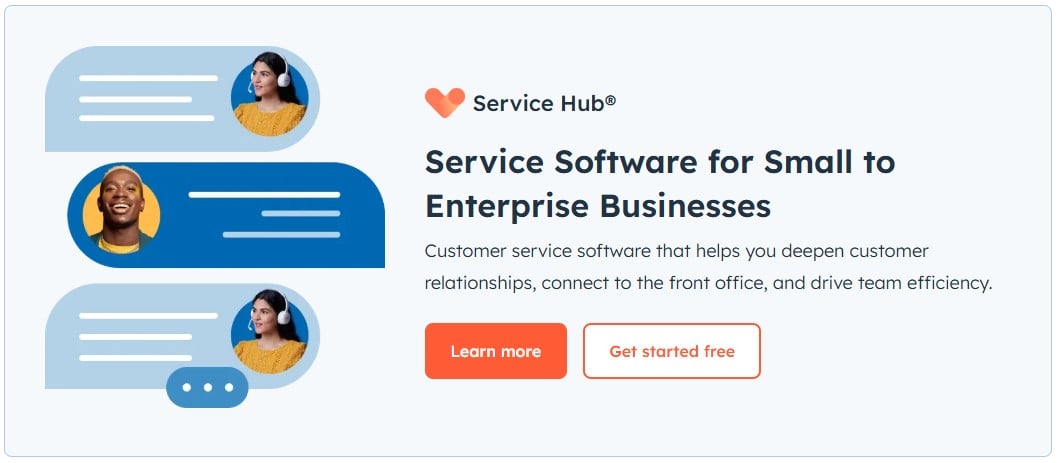
HubSpot Service Hub gives your support team everything they need to deliver fast, personalized customer service at scale. With AI and automation at its core, Service Hub turns reactive support into proactive customer success.
- Scale support. Centralize communication across chat, email, and social media in a shared inbox. Use automation and the Breeze Customer Agent to reduce response time and resolve issues more efficiently.
- Drive retention. Monitor customer satisfaction scores (CSAT), track engagement, and identify churn risks before they happen. Service Hub gives your team the insights needed to turn support into a growth engine.
For businesses focused on long-term customer relationships, HubSpot CRM offers unmatched value.
Popular features:
- Omni-Channel Help Desk. Manage customer conversations across email, chat, social media, and phone — all within a unified inbox. You can assign tickets, set priorities, and collaborate with teammates without losing context.
- Breeze Customer Agent. This smart AI assistant drafts replies, suggests solutions from your knowledge base, and summarizes conversations. It reduces response time and supports agents with intelligent recommendations.
- Customer Success Workspace. Go beyond support by tracking customer satisfaction, NPS scores, and usage patterns. Use this data to proactively engage with customers, identify churn risks, and boost lifetime value.
Service Hub turns your support team into a strategic driver of loyalty and retention.
Content Hub — Power Your Brand With Content at Scale

HubSpot Content Hub empowers marketers to create engaging content without relying on developers or external platforms. It’s built for modern content teams who need to move fast while staying consistent.
- Create content. Use AI tools like the Breeze Content Agent to write blog posts, emails, social content, and more. Maintain brand voice and tone while scaling your output across channels.
- Manage content. Organize and publish content using HubSpot’s scalable CMS. Manage SEO, update pages, and distribute content — all from a single dashboard that connects with every part of your CRM.
HubSpot makes it easy to fuel your entire customer journey with meaningful, high-impact content.
Popular features:
- Scalable CMS. A flexible content management system built for marketers — no coding required. Drag-and-drop page builders, dynamic content modules, and SEO recommendations make it easy to create optimized content.
- Brand Voice. Maintain consistency across all messaging with AI that aligns generated content to your company’s tone and style. It’s especially useful for large teams or businesses working with multiple content creators.
- Breeze Content Agent. This AI-powered writer helps you draft, edit, and refine copy for blogs, emails, and landing pages. It can repurpose content across formats and even generate outlines based on target keywords.
With Content Hub, you can fuel your marketing engine with high-performing content while maintaining full control over quality and branding.
Operations Hub — Activate Your Data With Automation
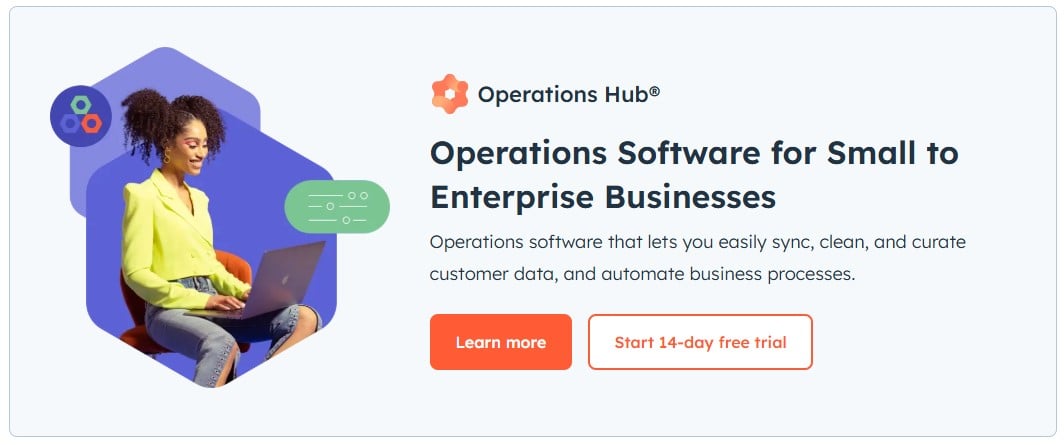
Operations Hub is designed for RevOps and data teams that want to build clean, connected systems behind the scenes. It helps manage and sync data across platforms, automate routine tasks, and maintain high-quality records across the organization.
Popular features:
- Data Sync. Connect HubSpot to your favorite tools — like Salesforce, Mailchimp, or Google Sheets — using two-way sync. This ensures all your data stays up-to-date, accurate, and accessible.
- Programmable Automation. Build custom-coded workflows that automate complex backend processes. From lead scoring to custom notifications, Operations Hub puts automation in your hands.
- AI-Powered Data Quality Automation. Clean messy records, merge duplicates, and standardize formats using AI-driven tools. It improves reporting, increases team confidence in the data, and reduces manual cleanup.
Operations Hub is perfect for fast-scaling businesses that rely on accurate data and automated infrastructure.
Commerce Hub — Get Paid Faster With Smart Billing Tools
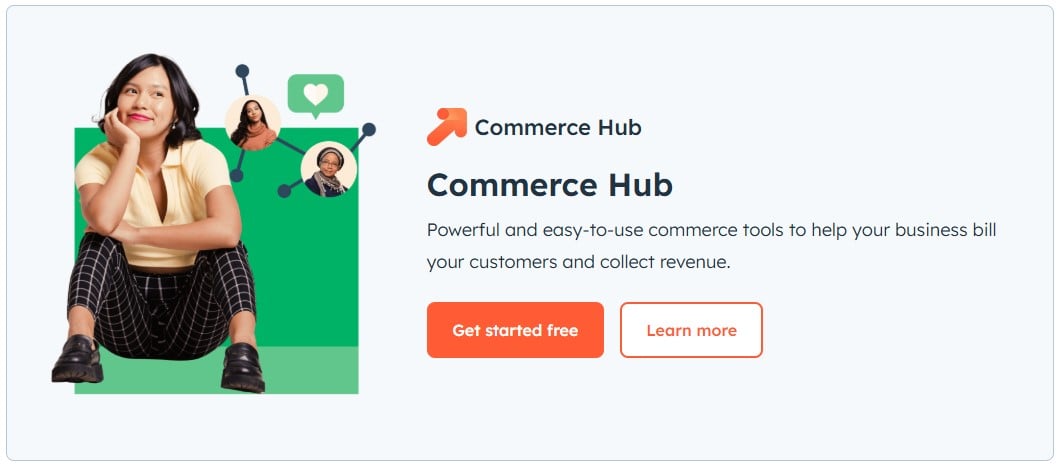
Commerce Hub simplifies B2B transactions by integrating payments and billing directly into the CRM. It’s built for businesses that want to turn quotes into revenue without leaving the platform.
Popular features:
- Invoices & Subscriptions. Easily create and manage recurring billing cycles, send branded invoices, and accept online payments. You can track open invoices and customer payment statuses in real time.
- Quotes. Generate custom quotes with product details, discounts, and terms. Enable customers to approve and pay directly from the quote, speeding up your sales cycle.
- Payment Links. Send secure, trackable payment links for one-time or recurring purchases. Perfect for SMBs that need flexible, fast ways to collect payments.
Commerce Hub gives you a frictionless path from quote to cash — no third-party billing tools are required.
HubSpot Starter Bundle — The Perfect CRM Toolkit for Small Businesses
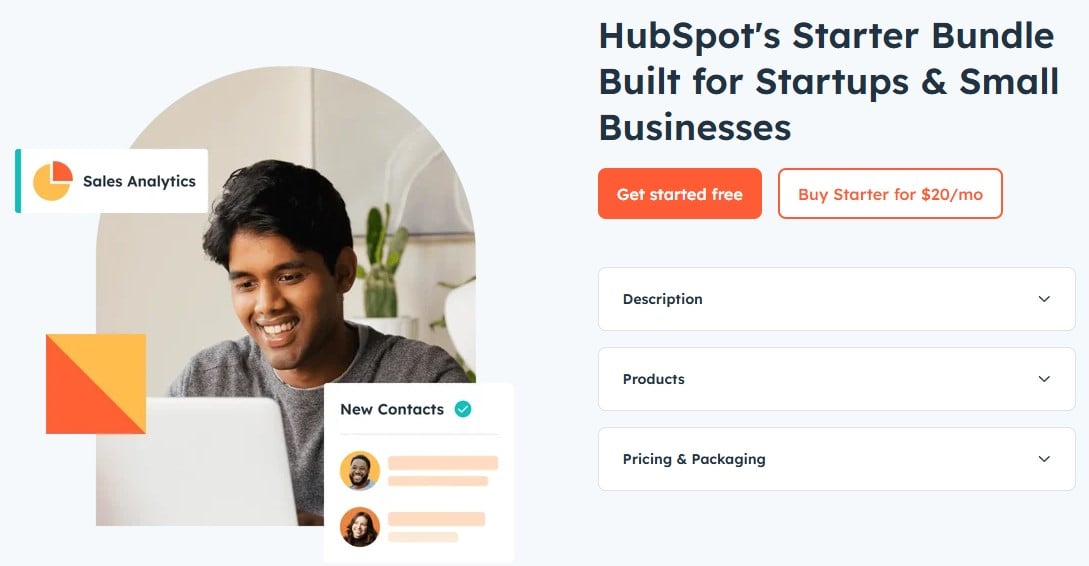
For startups and small businesses, HubSpot offers a Starter CRM Bundle — combining entry-level versions of each Hub in one affordable package. You get access to the essential features of Marketing, Sales, Service, Content, Commerce, and Operations Hubs — all at a discounted price.
This bundle makes HubSpot CRM pricing more accessible for early-stage businesses while keeping your systems aligned from day one.
Breeze: HubSpot’s AI-Powered Engine Transforming CRM in 2026
In 2026, AI isn’t a nice-to-have — it’s a necessity. That’s why HubSpot introduced Breeze, a fully integrated suite of AI-powered tools built directly into the HubSpot CRM platform. Breeze is designed to eliminate manual work, accelerate decision-making, and help businesses deliver smarter, faster, and more personalized customer experiences.
Whether you’re writing marketing emails, scoring leads, analyzing customer behavior, or handling support tickets, Breeze enhances every interaction with real-time intelligence and automation.
Let’s break down the components of HubSpot’s Breeze AI solution and how they work together to empower your teams.
Breeze Copilot — Your AI Assistant For Everyday Marketing, Sales, & Service Tasks
Breeze Copilot is your AI-powered sidekick built to streamline daily workflows across all HubSpot Hubs. It helps you:
- Draft personalized emails based on contact behavior and preferences
- Generate marketing campaign ideas, social media posts, and landing page copy
- Suggest subject lines and improve SEO in blog content
- Analyze campaign performance and recommend next steps
Integrated directly into HubSpot’s tools, Copilot turns brainstorming and execution into a single, seamless process — perfect for small teams and fast-paced environments.
Breeze Agents — Workflow Automation With Built-In Intelligence
Breeze Agents are specialized AI bots that automate complex workflows across marketing, sales, customer service, and operations. Think of them as digital coworkers that don’t sleep:
- Breeze Prospecting Agent identifies high-intent leads and recommends outreach strategies
- Breeze Customer Agent handles incoming support tickets, recommends responses, and escalates when needed
- Breeze Content Agent repurposes existing content across formats and channels, maintaining consistent brand voice
By automating time-consuming tasks, Breeze Agents free up human teams to focus on strategic work that drives revenue.
Breeze Intelligence — Smarter Insights, Better Decisions
Breeze Intelligence leverages machine learning and predictive analytics to help businesses act with clarity and precision. It provides:
- Lead scoring predictions based on behavioral data and conversion patterns
- Churn risk alerts for customer accounts showing signs of disengagement
- Sales forecasting based on pipeline activity, deal velocity, and historical performance
- Content performance analysis that identifies what’s resonating and why
These insights help sales reps, marketers, and support teams make faster, data-backed decisions that actually move the needle.
With Breeze, HubSpot CRM becomes not just a data management tool but an active driver of business performance. AI is embedded into the daily fabric of your workflows, allowing teams to work smarter without needing to switch between tools or platforms.
In 2026, businesses that want to stay competitive need more than just automation — they need intelligent systems that anticipate needs, adapt in real time, and help them grow. Breeze delivers on all of that, making HubSpot one of the most future-ready CRM platforms available today.
Core HubSpot Features: Everything A CRM Solution Needs
HubSpot is the ideal option for companies looking for robust, simple-to-use CRM software, and the platform is accessible to smaller or more start-up companies thanks to the lightweight but very functional free-forever plan. It also has a ton of helpful features that may be used to expand your business and achieve success in this field. Through a number of free CRM, marketing, sales, and customer care tools from HubSpot, this solution offers a functional way to handle and maintain new leads via a straightforward and user-friendly interface that includes dashboard reporting, deal tracking, and pipeline management. With HubSpot, you get things like:
- Convenient data work. You acquire the capacity to gather and manage several types of data about your calls, businesses, and contacts. Additionally, you can segregate by industry, size, location, value, or any other criteria you can think of using the Activity Feed and Lists.
- Automated CRM database. You can use an automated customer relationship management (CRM) database with this. When necessary, HubSpot advances customers along their customer lifecycle and updates customer profiles to track and measure each person’s interaction and customer journey. This lets your sales team know when a particular customer is ready to be addressed. This feature tightly integrates with the one before it.
- Dashboards. HubSpot offers analytics dashboards and statistics that make it simple to monitor how your target audience is responding to your marketing material. Additionally, you can track every stage of the customer lifecycle, see key patterns over time in your reports, access contacts in each stage of your processes, and analyze the volume and quality of website visitors on a page-by-page basis.
- Sales and Deals. HubSpot gives you the tools to import, manage, and create customized Deals.
- Landing pages, web pages, and blogs. In Hubspot, you can design blogs, effective landing sites, and SEO-optimized Web pages to tell your prospects who you are and what you provide. Additionally, you may include calls to action (CTAs) on these pages to point your visitor in the direction you believe will be most beneficial or impactful.
The platform’s key features are stated at the top, and we now want to go into greater detail about each of them.
HubSpot Automated CRM Database
The automated customer relationship management (CRM) database from HubSpot is at the center of everything your marketing and sales team does. When necessary, HubSpot advances customers along their customer lifecycle and updates customer profiles to track and measure each person’s interaction and customer journey. This lets your sales team know when a particular customer is ready to be addressed.
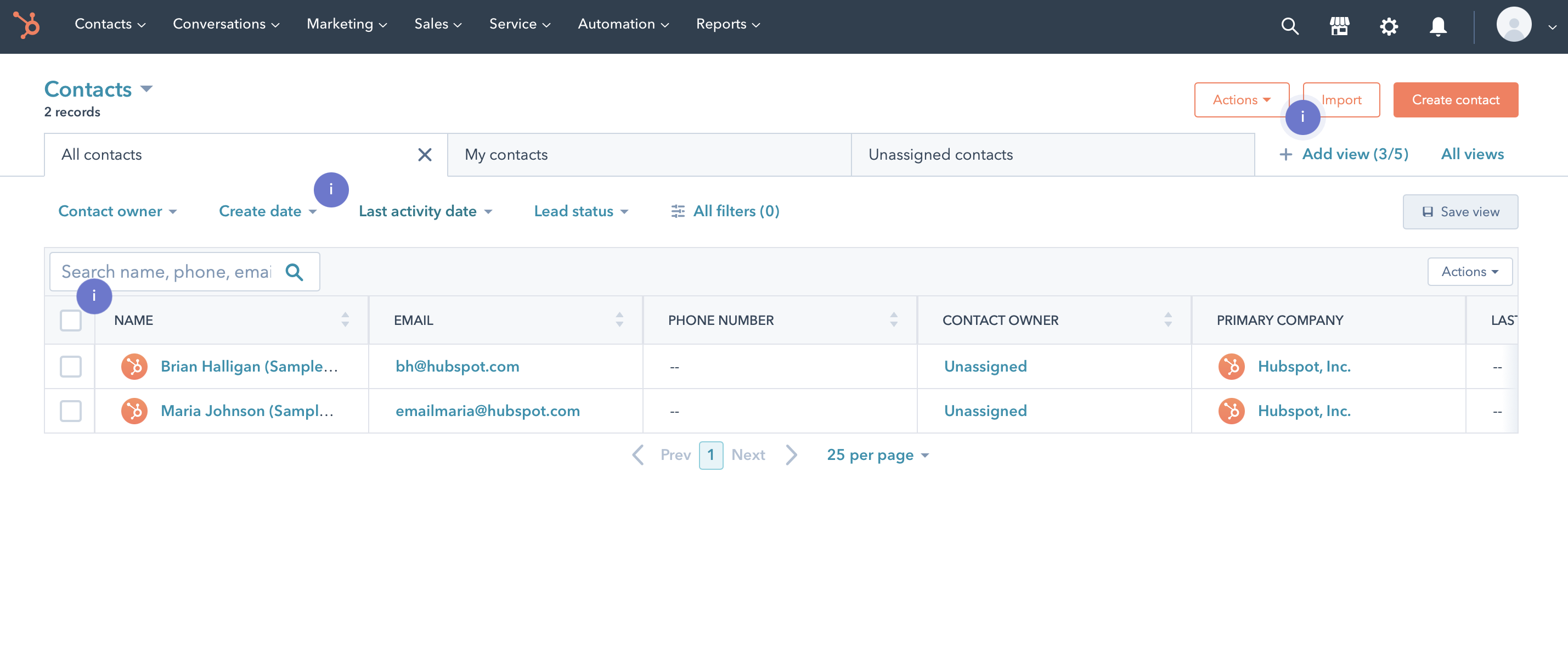
As a result, your sales and marketing teams may work together much more effectively and holistically. Everyone will have access to the same sources of information and updates, and no contacts will be missed or given the incorrect information.
HubSpot Analytics
Become a data-driven marketer by tracking the performance of each element of your marketing initiatives in one location. HubSpot offers analytics dashboards and statistics that make it simple to monitor how your target audience is responding to your marketing material. Additionally, you can track every stage of the customer lifecycle, see key patterns over time in your reports, access contacts in each stage of your processes, and analyze the volume and quality of website visitors on a page-by-page basis.
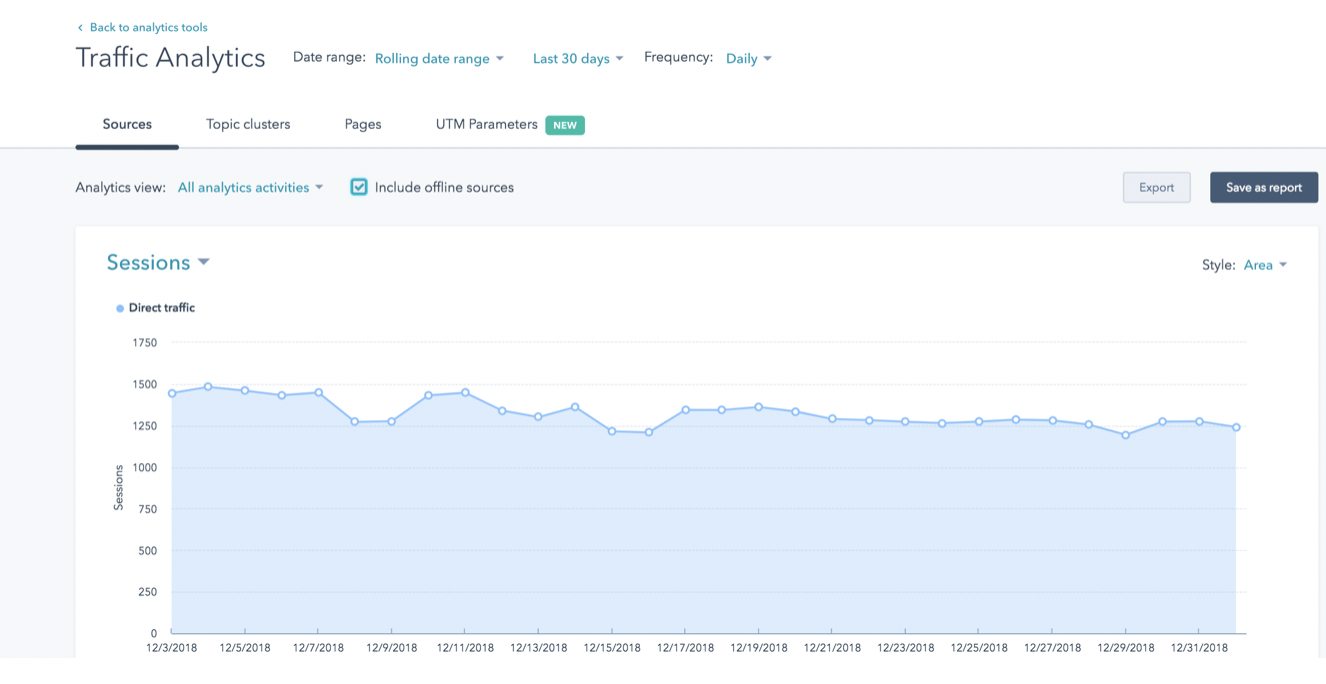
Dashboards can help your marketing and sales teams collaborate more effectively and use a single set of data analytics and reports to guide decisions and track progress.
For instance, HubSpot offers analytics dashboards and data to make it simple to monitor how your audience is responding to your emails. View an overview of email performance quickly to see which subjects attract your prospects the most and the times and days that result in the most effective interaction.
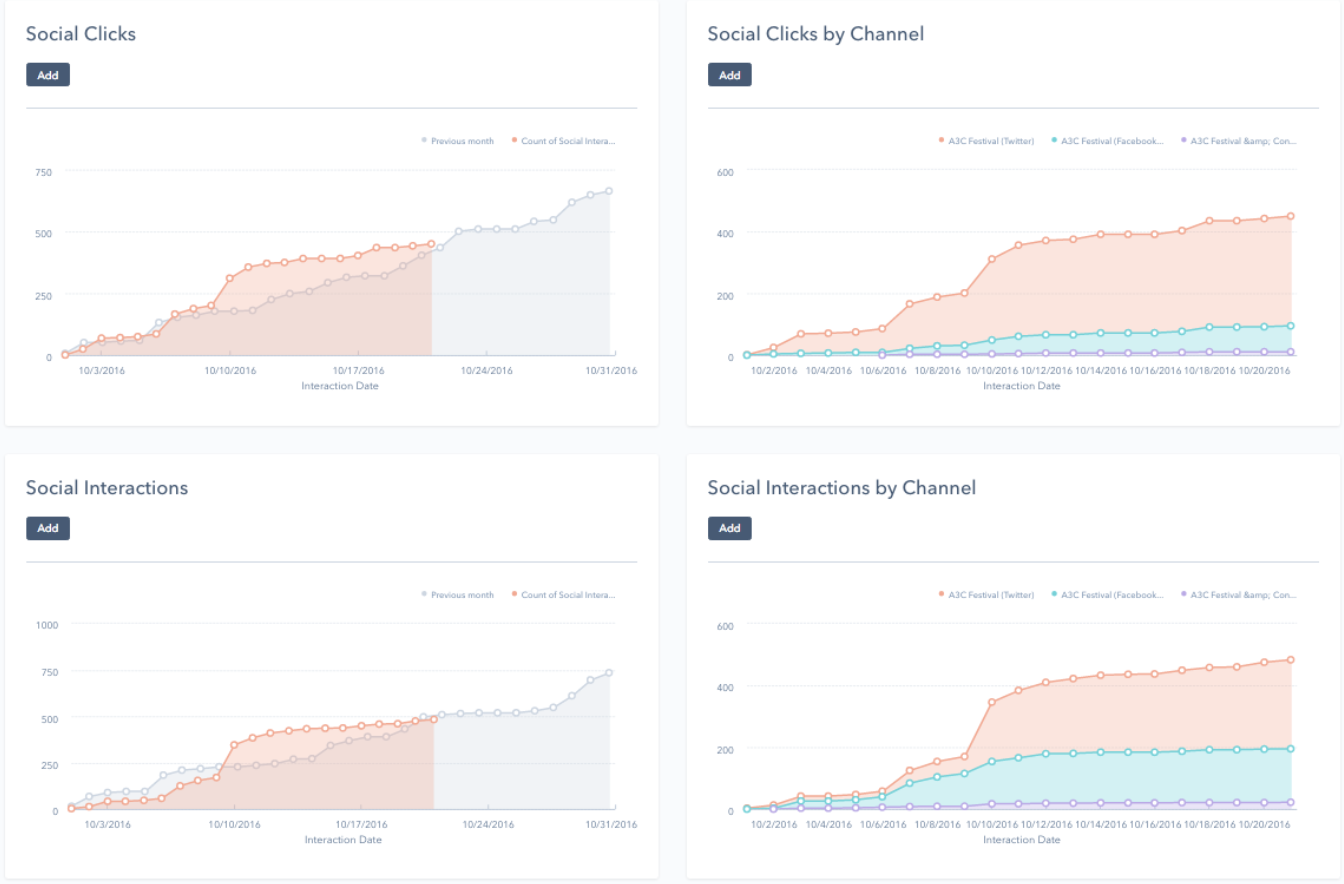
You can view a variety of engagement analytics for a specific email by clicking on it in your database. These analytics include the percentage of successful deliveries, the open rate, the click-through rate, a heatmap of the links that have been clicked, and the ratios of whether your contacts read, skimmed, or glanced the email. To keep track of the complete context of the email, you can also simply examine which workflows the email is a part of.
HubSpot Social Media Management
HubSpot interacts with a variety of social media networks, making it simple for users to link numerous accounts, draft, schedule, publish, and track engagement on posts all from the same location. Another helpful aspect of the platform’s “all-in-one” nature is that it allows marketers to easily keep track of the effectiveness of all aspects of their marketing campaigns, compare and contrast data analytics, and conduct market research. This allows them to understand in real-time what content people are engaging with and gain insight into the best times and days to post.
HubSpot Pricing Explained: What You Need to Know Before You Buy
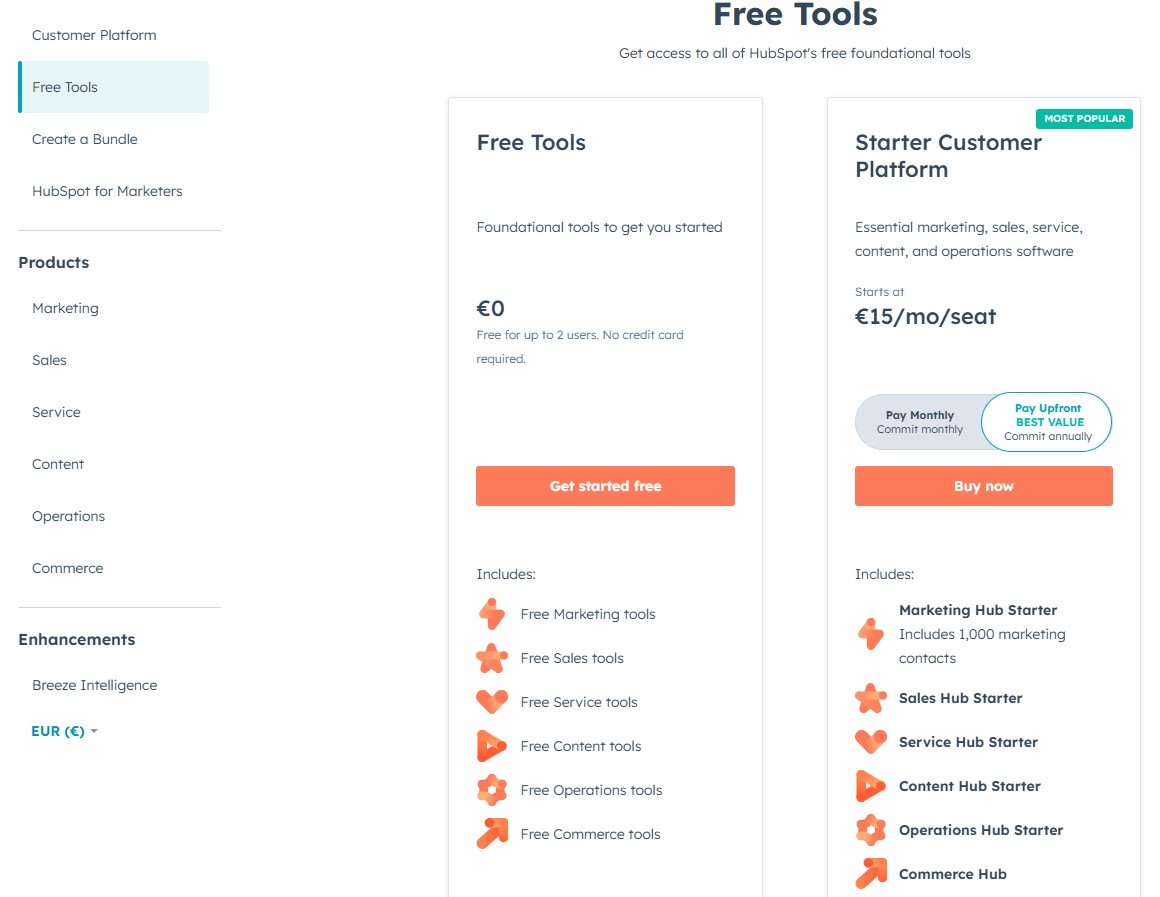
Understanding HubSpot pricing can be a bit overwhelming at first glance. With multiple products, tiered plans, and add-ons based on contact volume and user seats, it’s easy to get lost in the details. But once you break it down by solution and business size, HubSpot’s pricing model becomes much more manageable — and even flexible. Whether you’re a startup exploring HubSpot CRM for the first time or an enterprise scaling across departments, there’s a plan tailored to your needs.
HubSpot CRM Platform: Free Tools for Every Team
The good news? HubSpot CRM offers a robust free plan that includes essential tools for contact management, email marketing, live chat, reporting dashboards, and more. This free tier is ideal for small businesses or startups looking to unify their customer data and begin building a digital presence without upfront investment. You can use it indefinitely, and it integrates seamlessly with all other HubSpot Hubs — making it a great entry point into the ecosystem.
Marketing Hub Pricing: Based on Contacts and Features
HubSpot Marketing Hub is priced based on the number of marketing contacts — that is, contacts you actively market to via email or ads. The Starter plan begins at $20/month per seat, including 1,000 marketing contacts. As your contact list grows, you can purchase additional contacts in increments of 1,000, starting at $50/month.
The Professional plan, which unlocks advanced features like marketing automation workflows, SEO tools, and campaign analytics, starts at $890/month for 2,000 contacts and three seats. Additional 5,000-contact blocks cost $250/month, and onboarding requires a one-time $3,000 fee.
For larger teams, the Enterprise plan starts at $3,600/month for 10,000 contacts and five seats. It includes advanced reporting, team permissions, and AI-powered campaign orchestration. Additional contacts and seats are priced separately, and onboarding costs $7,000.
Sales Hub Pricing: Affordable and Scalable for Growing Teams
HubSpot Sales Hub is more affordable than the Marketing Hub and is priced per user. The Starter plan starts at $20/month per seat, offering tools like email tracking, meeting scheduling, and basic pipeline management.
The Professional plan costs $100/month per seat and includes features like sales automation, custom reporting, and forecasting. For large sales teams, the Enterprise plan is priced at $150/month per seat and includes advanced permissions, playbooks, and predictive lead scoring.
Sales Hub is ideal for businesses focused on building a pipeline and closing deals faster, and its pricing structure makes it easy to scale as your team grows.
Service Hub Pricing: Scalable Support for Every Business
HubSpot Service Hub follows a similar pricing model to Sales Hub. The Starter plan begins at $20/month per seat, offering ticketing, live chat, and a shared inbox.
The Professional plan is priced at $100/month per seat, unlocking features like customer feedback surveys, automation, and a knowledge base. The Enterprise plan, at $150/month per seat, includes advanced features such as custom objects, playbooks, and SLAs.
For businesses looking to scale customer support and improve retention, Service Hub provides a powerful, AI-enhanced help desk system that grows with your team.
Content Hub Pricing: AI-Powered Content Creation and Management
HubSpot Content Hub, formerly part of the CMS Hub, is now a standalone solution focused on content marketing. The Starter plan begins at $25/month, offering basic website tools and blogging capabilities.
The Professional plan, starting at $400/month, includes dynamic content, SEO recommendations, and AI content generation tools. The Enterprise plan, priced at $1,200/month, adds brand governance, advanced reporting, and multi-language content management.
This hub is ideal for businesses that rely heavily on content to drive traffic and leads, and it integrates seamlessly with Marketing Hub for full-funnel content strategies.
Operations Hub Pricing: Automate and Clean Your Data
HubSpot Operations Hub is designed for RevOps and data teams. The Starter plan starts at $20/month, offering basic data sync and workflow extensions.
The Professional plan, at $800/month, includes programmable automation and data quality tools powered by AI. The Enterprise plan, priced at $2,000/month, adds advanced governance, custom code actions, and team permissions.
Operations Hub is essential for businesses that want to maintain clean, reliable data across platforms and automate backend processes.
Commerce Hub Pricing: Streamlined Payments and Billing
HubSpot Commerce Hub is a newer addition focused on B2B transactions. Pricing is flexible and often bundled with other Hubs. It includes tools for quotes, invoices, subscriptions, and payment links — all integrated directly into the CRM. While exact pricing depends on usage and configuration, many features are available in the Starter CRM Suite or as part of Sales Hub Professional and above.
HubSpot CRM Suite Bundles: All-in-One Value for Growing Businesses
For businesses that want access to multiple Hubs, HubSpot offers CRM Suite bundles at Starter, Professional, and Enterprise tiers. These bundles combine Marketing, Sales, Service, Content, Operations, and Commerce Hubs into a single discounted package.
The Starter CRM Suite starts at $20/month per seat, offering incredible value for small businesses. The Professional CRM Suite starts at $1,600/month, while the Enterprise CRM Suite begins at $5,000/month, depending on contact volume and seat count.
These bundles are ideal for companies looking to unify their front office with a single, integrated platform — and they often provide better value than purchasing Hubs individually. If you still doubt that HubSpot is worth using in 2026, pay attention to the following alternatives:
HubSpot Alternatives: When Is Another CRM a Better Fit?
While HubSpot CRM offers an impressive all-in-one platform, it’s not the perfect fit for every business. Some users may find it too complex, others may be limited by pricing, and a few may be looking for even more cutting-edge AI capabilities. If you’re exploring a HubSpot alternative, here are three standout options in 2026, each excelling in a specific area.
Pipedrive — Less Complex Alternative

If you’re a small team looking for a CRM that’s easier to navigate and quicker to implement, Pipedrive is a compelling HubSpot alternative. It’s designed with simplicity in mind, focusing on sales pipeline management with an intuitive drag-and-drop interface that requires minimal training. Pipedrive doesn’t overwhelm users with marketing or service tools, making it perfect for sales-first organizations that want to stay laser-focused on closing deals.
Unlike HubSpot, which bundles multiple Hubs together, Pipedrive strips things down to the essentials. It offers email integration, custom fields, workflow automation, and visual pipelines — all in a lightweight, user-friendly experience. If you’re asking why choose HubSpot but feel overwhelmed by its learning curve, Pipedrive might be the simpler, more approachable solution.
Zoho CRM — More Affordable Alternative

For businesses on a tight budget, Zoho CRM stands out as a more affordable HubSpot alternative that still delivers a powerful set of features. Pricing starts at just $14/user/month, significantly lower than HubSpot’s mid-tier or enterprise plans. Even at this entry-level price, you get lead management, workflow automation, AI-powered sales predictions (via Zia), and integrations with other Zoho tools.
Zoho CRM is particularly attractive for startups and small businesses that need to stretch every dollar. It offers both flexibility and customization without hidden contact-based pricing. While it may lack some of HubSpot’s polish and UX, Zoho makes up for it in value — giving you many of the same capabilities without the hefty price tag.
Salesforce Einstein — More AI-Feature-Rich Alternative

If your team is searching for a CRM platform with more advanced AI capabilities than HubSpot, Salesforce with Einstein AI leads the pack. While HubSpot’s Breeze AI is powerful and well-integrated, Salesforce Einstein takes things a step further with deep predictive analytics, intelligent automation, and custom machine learning models tailored to enterprise workflows.
Salesforce Einstein can identify upsell opportunities, recommend actions based on historical data, and even score leads using AI models trained on your business’s unique behavior. It integrates across Salesforce products — including Sales Cloud, Service Cloud, and Marketing Cloud — making it a great fit for enterprises seeking next-level intelligence and hyper-personalization.
That said, Salesforce comes with a steeper price and a longer onboarding process than HubSpot. It’s best suited for larger companies with the budget and resources to fully leverage its advanced AI infrastructure.
Still not sure which platform is right for you? In the next section, we’ll help you decide why you should choose HubSpot — or when it makes sense to go with an alternative.
Final Verdict: Why Choose HubSpot in 2026?
If you’ve made it this far, you’re probably still asking the big question: why choose HubSpot in 2026? The answer lies in the platform’s unique ability to unify your marketing, sales, service, and content efforts under one powerful, AI-driven CRM. Whether you’re a fast-growing startup or an established enterprise, HubSpot CRM offers the scalability, usability, and automation you need to stay competitive in today’s customer-centric landscape.
Let’s break it down.
The Advantages of HubSpot CRM
HubSpot’s biggest strength is its all-in-one platform. With Marketing Hub, Sales Hub, Service Hub, Content Hub, Commerce Hub, and Operations Hub working together seamlessly, your entire front office is connected — no patchwork of third-party tools is needed. The user-friendly interface, deep integration across Hubs, and built-in AI tools like Breeze Copilot and Breeze Agents make it possible to scale quickly without sacrificing productivity or customer experience.
Its free CRM tools offer an accessible entry point, while its Starter, Professional, and Enterprise pricing tiers provide flexibility for businesses of all sizes. HubSpot also shines in onboarding, support, and education, with the HubSpot Academy offering one of the most robust free learning libraries in the SaaS industry.
The Drawbacks of HubSpot CRM
That said, HubSpot isn’t perfect. As your business grows, the pricing model — especially in the Marketing Hub — can become complex and costly, particularly as your contact list expands. Some advanced features, such as custom reporting or advanced segmentation, are locked behind higher-tier plans. Additionally, businesses that need extreme customization or industry-specific workflows might find HubSpot less flexible than platforms like Salesforce.
So, Is HubSpot Right For You?
If you want a CRM that’s intuitive, powerful, and built to scale, HubSpot is one of the best platforms in 2026. It combines the ease of use of smaller tools with the enterprise power of bigger platforms, all backed by strong AI capabilities and unmatched integration across departments. For companies that value collaboration, visibility, and automation, HubSpot CRM is more than a tool — it’s a growth engine.
When to Consider a HubSpot Alternative
Still, your final choice depends on your priorities. If your team values simplicity above all, Pipedrive may be the easier fit. If budget is your top concern, Zoho CRM offers an incredibly affordable starting point. And if you’re seeking the most advanced AI features on the market, Salesforce may be worth the steeper learning curve.
But if you want a platform that balances all three — ease of use, flexibility, and AI innovation — HubSpot CRM remains one of the smartest choices for businesses in 2026.
Frequently Asked Questions About HubSpot CRM
What is HubSpot CRM used for?
HubSpot CRM is a cloud-based customer relationship management platform used to manage contacts, automate marketing, streamline sales pipelines, support customer service, and create content. It helps businesses of all sizes improve customer experience and grow efficiently.
Is HubSpot really free?
Yes, HubSpot offers a completely free CRM tier with core features for contact management, email marketing, forms, reporting dashboards, and more. It’s ideal for startups and small teams looking to get started without upfront costs.
How much does HubSpot cost?
HubSpot pricing varies by product and tier. Starter plans begin at $20/month, while Professional and Enterprise tiers can range from $100 to $3,600+ per month, depending on the number of users and contacts. Some plans also include onboarding fees.
Which HubSpot plan is best for small businesses?
The Starter CRM Suite is best for small businesses. It includes basic tools from all major Hubs — Marketing, Sales, Service, Content, and Operations — at an affordable monthly rate. It’s designed for fast-growing teams that want an all-in-one solution without complexity.
Why choose HubSpot over other CRMs?
HubSpot stands out for its ease of use, all-in-one platform, and built-in AI features like Breeze Copilot. It allows marketing, sales, and service teams to work from the same system, providing a unified view of the customer and improving collaboration across departments.
What makes HubSpot different from Salesforce?
While Salesforce offers deeper customization and enterprise-level AI (Einstein), HubSpot is easier to use out of the box and includes a free tier, making it more accessible for small to mid-sized businesses. HubSpot’s interface, onboarding, and integrated tools also make it faster to implement.
Can you use HubSpot for marketing automation?
Yes, HubSpot Marketing Hub includes powerful marketing automation features, allowing you to build email workflows, lead nurturing sequences, and behavior-based triggers. These tools help businesses scale personalized marketing with less manual effort.
What is HubSpot’s Breeze AI?
Breeze is HubSpot’s AI engine introduced in 2024. It includes Breeze Copilot (task assistance), Breeze Agents (workflow automation), and Breeze Intelligence (data enrichment and insights). Breeze makes it easier to work smarter across sales, marketing, and service.
Does HubSpot integrate with other tools?
Yes, HubSpot integrates with over 1,000+ third-party apps, including Salesforce, Gmail, Outlook, Slack, Zoom, WordPress, and Shopify. The Operations Hub also supports data sync and programmable automation between systems.
What are the best HubSpot alternatives in 2026?
The top HubSpot alternatives depend on your priorities. For simplicity, Pipedrive is a user-friendly choice. For affordability, Zoho CRM offers strong features at low cost. For advanced AI capabilities, Salesforce Einstein delivers enterprise-grade intelligence and customization.


